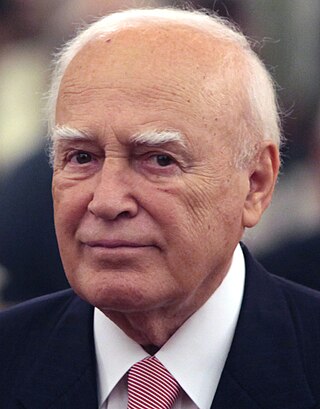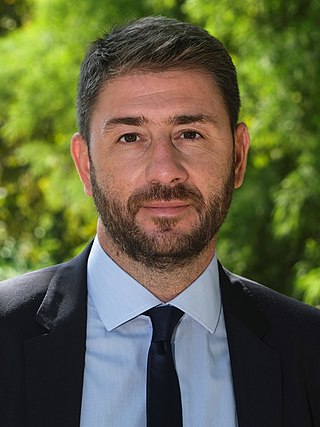
Konstantinos "Kostis" Stephanopoulos was a Greek conservative politician who served two consecutive terms as the president of Greece from 1995 to 2005.

Christos Sartzetakis was a Greek jurist and a supreme justice of the Court of Cassation, who served as the president of Greece from 1985 to 1990.

Karolos Papoulias was a Greek politician who served as the president of Greece from 2005 to 2015.

The Coalition of the Radical Left – Progressive Alliance, best known by the syllabic abbreviation SYRIZA, is a centre-left to left-wing political party in Greece. It was founded in 2004 as a political coalition of left-wing and radical left parties, and registered as a political party in 2012.

Prokopios "Prokopis" Pavlopoulos is a Greek retired politician, who served as the president of Greece from 2015 to 2020. A member of New Democracy, he previously was Minister of the Interior from 2004 to 2009. He was succeeded by Katerina Sakellaropoulou on 13 March 2020, who became the first woman to serve as President of Greece.

An indirect presidential election was held in Greece on 3 February 2010. Incumbent President Karolos Papoulias was nominated by the ruling PASOK party and secured the support of the main opposition party, New Democracy, as well as that of the smaller LAOS. Papoulias stood unopposed and was elected on the first ballot, with 266 votes.

Parliamentary elections were held in Greece on Sunday 25 January 2015 to elect all 300 members of the Hellenic Parliament in accordance with the constitution. The election was held earlier than scheduled due to the failure of the Greek parliament to elect a new president on 29 December 2014.

Indirect presidential elections were held in Greece in December 2014 and February 2015 for the succession to Karolos Papoulias as President of the Hellenic Republic. The candidate of the ND–PASOK government, Stavros Dimas, failed to secure the required majority of MPs of the Hellenic Parliament in the first three rounds of voting in December. According to the provisions of the Constitution of Greece, a snap election was held on 25 January 2015, which was won by the left-wing Syriza party. Following the convening of the new Parliament, the presidential election resumed. On 18 February 2015, veteran ND politician Prokopis Pavlopoulos, backed by the Syriza-ANEL coalition government, was elected with 233 votes.

An indirect election for the position of President of the Hellenic Republic was held by the Hellenic Parliament in 1995.

Parliamentary elections were held in Greece on Sunday, 20 September 2015, following Prime Minister Alexis Tsipras' announced resignation on 20 August. At stake were all 300 seats in the Hellenic Parliament. This was a snap election, the sixth since 2007, since new elections were not due until February 2019.

Nikos Androulakis is a Greek politician who serves as president of the PASOK – Movement for Change since 2021. He served also as Member of the European Parliament from 2014 to 2023.
An indirect election for the position of President of the Hellenic Republic was held by the Hellenic Parliament in April–May 1980.

Nikos Alivizatos is a Greek jurist, academic and politician. He is currently a professor of Constitutional Law at the University of Athens. Alivizatos served as the Minister of the Interior for one month in the Third Cabinet of Costas Simitis.

The 2024 European Parliament election in Greece was held on 9 June 2024 as part of the 2024 European Parliament election. This was the first to take place after Brexit.

Katerina Sakellaropoulou is a Greek judge who has been the president of Greece since 13 March 2020. She was elected by the Hellenic Parliament to succeed Prokopis Pavlopoulos on 22 January 2020. Prior to her election as president, Sakellaropoulou served as president of the Council of State, the highest administrative court of Greece. She is the country's first female president.
Ioannis Tragakis is a Greek politician, member of the New Democracy party (ND) and a surveyor engineer.

The Democrats is a Greek political party founded in 2024 by former PASOK–KINAL politician Andreas Loverdos.
An indirect presidential election was held in Greece on 25 January 2025 for the President of the Hellenic Republic. A second round will be held on 31 January 2025 after no candidate won a majority in the Hellenic Parliament.















